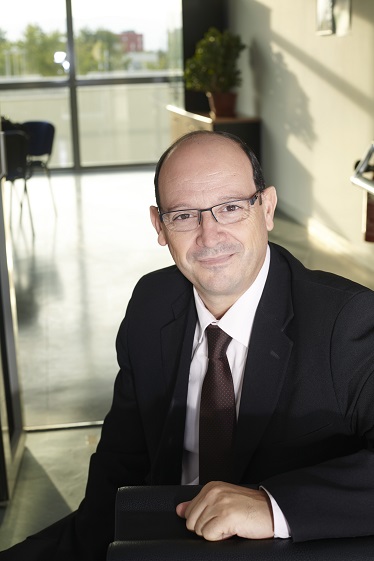Every year, Grenoble-INP oversees around ten Nanoelec/Easytech projects, which have been increasingly focused on digital technology, connected systems and embedded artificial intelligence. Karim Chibane, Head of Technology Transfer at Esisar and Head of the Grenoble-INP Easytech Program, explains.

Karim Chibane, Head of Technology Transfer at Esisar and Head of the Grenoble-INP Easytech Program. (c) Esisar
Can you tell us about the Esisar program?
Every year for more than 20 years, the infrastructure and organization at Esisar has enabled the launch of thirty or so industrial projects in conjunction with companies from the Auvergne-Rhône-Alpes region. Each year, about ten of these projects are part of the Nanoelec/Easytech program, run by the global innovation cluster Minalogic.
How are the projects carried out?
Each year, Esisar fourth-year engineering students break up into 3-person teams to work on a project for a company. From January to June, each group has access to its own entirely equipped facility. Students are ensured to benefit from university/company supervision and support on a daily basis.
All the teams work in the same location and have access to pooled services and professional logistic and technical support. The R&D collaborative projects are carried out in optimal operational conditions and in compliance with the confidentiality requirements of partner companies.
How have the needs of companies, and as a result, Nanoelec/Easytech projects, evolved at Grenoble-INP?
Companies work with us on industrial projects in order to obtain POC (Proof of Concept) and, subsequently, functional demonstrators as part of product improvement or product development processes. It primarily deals with incremental innovation.
In 2020, technological areas such as embedded artificial intelligence and edge computing began to emerge. Projects also focus increasingly on safety and cybersecurity issues and take into account a secure-by-design approach.
What does the Nanoelec framework provide?
As part of the Nanoelec/Easytech program, projects benefit from the expertise and skills of Nanoelec partners. Startups, micro businesses and SMEs are backed by the Nanoelec ecosystem: a means to boost their R&D teams and ensure employee upskilling. The certification phase guarantees high-quality standards that provide solid foundations for the project.
In addition, the projects can count on the IRT’s industrial know-how. To produce robust, simple, inexpensive demonstrators/proof of concepts, our laboratories often use mature technological components or building blocks, such as microcontrollers, sensors and actuators, and reusable wireless interfaces during the project’s subsequent pre-industrialization process.
Can other Grenoble-INP Group entities carry out Nanoelec/Easytech projects?
In order to continuously and effectively meet the needs of companies, Grenoble-INP focuses on three areas : academic training of engineers, research and value creation. The primary goal is to provide support for innovation processes and collaborative R&D programs and make them readily available to startups, micro businesses and SMEs. With more than 20 years of experience at Esisar, it is safe to say that we have succeeded in creating innovation synergy within the regional ecosystem in order to drive company innovation. We are striving to increase these types of collaboration, in particular with Grenoble-INP Group research laboratories and technological platforms in order to profit from their wide range of competencies.
Finally, it is a means, for new generations of Grenoble-INP engineering graduates to become more familiar with tomorrow’s environments such as startups, micro businesses and SMEs that provide growing employment opportunities.




